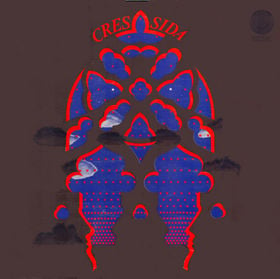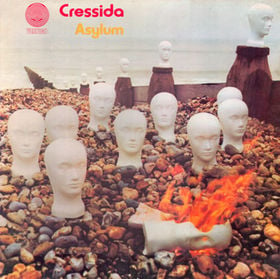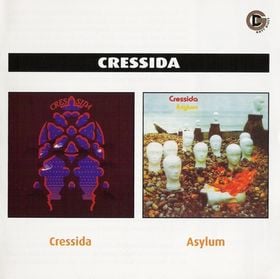/PAlogo_v2.gif) |
|
Post Reply 
|
| Author | |
Prog Geo 
Forum Senior Member 

Joined: November 09 2010 Location: Athens (Greece) Status: Offline Points: 2555 |
 Topic: Cressida Topic: CressidaPosted: July 02 2011 at 12:30 |
|
I know. Asylum is great.
|
|
|
Sonorous Meal show every Sunday at 20:00 (greek time) on http://www.justincaseradio.com
|
|
 |
|
Saperlipopette! 
Forum Senior Member 

Joined: December 20 2010 Location: Tomorrowland Status: Offline Points: 11945 |
 Posted: July 02 2011 at 10:45 Posted: July 02 2011 at 10:45 |
|
You'll undoubtly love Asylum Prog Geo. Broke my heart when I read somewhere that it initially only sold 800 copies. Extremely unfair. Wonderful album with gorgeous melancholic mood and and wonderful melodies (love the debut as well). I find Cressida to be a much more interesting and talented band that had greater potential than the bands they normally get compared to (Fantasy, Cracious, Beggars Opera etc...)
Very nice interview, Torodd. |
|
 |
|
Prog Geo 
Forum Senior Member 

Joined: November 09 2010 Location: Athens (Greece) Status: Offline Points: 2555 |
 Posted: July 02 2011 at 10:31 Posted: July 02 2011 at 10:31 |
|
Cressida is one of my favorite obscure prog rock bands. I'm lucky that I found their debut in Greece. I hope to find Asylum too. Great interview! Congratulations torodd!
|
|
|
Sonorous Meal show every Sunday at 20:00 (greek time) on http://www.justincaseradio.com
|
|
 |
|
toroddfuglesteg 
Forum Senior Member 

Retired Joined: March 04 2008 Location: Retirement Home Status: Offline Points: 3658 |
 Posted: July 02 2011 at 09:18 Posted: July 02 2011 at 09:18 |
|
CRESSIDA were an excellent band of early British symphonic progressive scene. Their sound is mostly dominated by the most beautiful and symphonic Hammond organ (dirty, and mellow), piano, bass, guitar, and drums. The instrumental sections are equally good, and tend to be typical of early 70s English prog rock. Thanks to the captivating atmospheres and the technical ability of the musicians. Similar bands include FANTASY, BEGGARS' OPERA, CIRKUS, GRACIOUS, and SPRING. Cressida broke up many, many fullmoons ago. I got in touch with Iain Clark for the Cressida story. This is a true prog archives interview for the benefit of our current and upcoming generations of Cressida fans. #####################################################################################
When
was Cressida born and how was the early days of the band ? How did
you get a record deal with Vertigo ?
I
suppose the origins of the band go back to 1968 when Angus Cullen and
John Heyworth first met in a London band they were both in for a
brief time. When that broke up they shared a flat and started writing
songs together. They were keen to put a band together so put adverts
in the national music press, and that’s how Kevin McCarthy and
myself came to link up with them. They had another keyboard player
at the start but he left and through a mutual friend I got in touch
with Peter Jennings who came for an audition. He fitted in
immediately, so we offered him the job. Those early days were spent
rehearsing and doing gigs around the London club circuit.
As
for the record deal, Ossie Byrne who had been the original producer
for the Bee Gees came to audition us. He must have liked what he saw
and heard because he signed us up almost immediately. We then went
into a small studio to make some demos. Initially there was a lot of
talk about us signing for the Elektra which was a very cool label and
we would have been the first UK band to sign with them. But in the
end Philips, who had just set up Vertigo, offered us a deal which we
accepted.  Your
debut album was Cressida from 1970. Please tell us more about this
album.
It
was recorded at Wessex Studios in North London. The studios at that
time were owned by George Martin. Over the years an amazing number of
artists have recorded great albums in that studio; Queen, The
Stones, King Crimson, Sex Pistols, Clash and Coldplay to name a few.
All
the numbers on that first album were pretty well rehearsed as we had
been performing them live on stage for quite a while. Nearly all the
songs were written by Angus and John although we all contributed to
the arrangements. Just before we went into the studio we were
playing in Germany at the Star Club, Hamburg where we did a lot of
those numbers so it didn’t take long to lay the tracks down. They
were mostly recorded live in the studio. There were some overdubs of
course; harmonies etc. but it was pretty much live. Contrary to what
has often been reported, the Mellotron never played a big part in our
setup. There was one in the studio and I guess Peter had been playing
around with it so we decided to use it, but it was only on part of
one number as I recall.  Your
second album was Asylum from 1971. Please tell us more about this
album.
We
recorded ‘Asylum’ at IBC studios, again with Ossie Byrne
producing, although by then we had become pretty experienced in the
studio and were much more hands-on. John Heyworth had left the band
in May ’70, replaced by John Culley, and we started the second
album in June ’70. The writing duties had already begun to fall
more on Angus and Peter, and with Peter’s pieces such as ‘Munich’,
the band were shifting towards more complex arrangements with
different movements and time sequences.
The
first album contained twelve numbers whilst the second had only
eight, reflecting the increasing move towards longer more intricate
numbers. The only number not written by Angus or Peter was the final
track, ‘Let Them Come When They Will’ which had been written by
John Heyworth. This had been a feature of our live stage show for a
long time and we were keen to record it.
The
other significant development with the second album was the use of a
full orchestra on several of the tracks. Looking back now, whilst
the orchestra undoubtedly added depth and texture to songs like
Munich and Lisa, it was perhaps overused somewhat and in retrospect
its inclusion on other numbers was less convincing. But I remember
the thrill of being in the studio listening to this huge orchestra
adding these arrangements to our songs. The other myth I want to
dispel is that Paul Layton and Harold McNair were members of the
band. Paul was a friend of ours and although he sang backing
harmonies on one or two numbers, he was never in the band. Harold
McNair was a renowned artist and session musician brought in to add
flute to a couple of songs. He was an amazing flautist, one of the
very best in the business, but he too was never in Cressida.
For
those of us unknown with your music; how would you describe you music
and which bands would you compare yourself with?
That’s
a really tough question. We knew at the time we were part of the
‘progressive music’ movement and we were happy to identify with
that. Although the tracks on the first album were all quite short in
length they were extremely varied in style and structure, ranging
from quite heavy numbers to much lighter songs with a strong acoustic
feel. We drew on all sorts of styles, rock, folk and jazz, but
Cressida’s music was principally based around melodic songs with
strong instrumental sections and a sound heavily underpinned by the
Hammond organ and piano. Peter’s virtuoso Hammond work added a
particular dimension to our sound, and Angus’ voice was not your
typical rasping rock voice; it was much more controlled and clean.
Later we began to do longer numbers with extended instrumental
passages. Some of these were very tightly arranged whilst others
offered scope for pure improvisation.
Who
did we compare ourselves with? I’m not sure whether we compared
ourselves with anyone really. Our influences were wide ranging and
we were listening to bands like Jefferson Airplane, the Doors,
Quicksilver Messenger Service, Spirit, Chicago, Moby Grape, Steve
Miller, Allman Brothers, Mothers of Invention etc. Of course, we had
all been influenced by the Beatles and the Stones and were well aware
what bands were happening in the UK, but it was mainly American
groups we listened to at that time.
After
September 1970, you moved to Uriah Heep, John Culley joined Black
Widow and Cressida dissolved. What really happened and why did
Cressida split up?
There’s
no doubt in my mind that Cressida broke up too early. The real
problem was that we were not getting enough gigs to sustain the
band’s operation. It was one of the failings of the band’s
management that we were never taken on by one of the big booking
agents. The gigs we did were good and the band’s live shows were
always well received but it was a struggle to maintain the momentum.
I suppose we became a bit disillusioned and this led to tensions and
the inevitable personality clashes. Peter in particular became very
disenchanted with the music business and announced that he wanted to
leave, so in the end the band broke up in October 1970. I don’t
recall there was any major falling out....... it was just a parting
of the ways.
Looking
back on it, it was crazy to break up before the second album was
released. If we had kept the band together until ‘Asylum’ came
out in February ’71 things might have been different. The second
album got very good reviews but it was already too late. We were
gone.
Ironically,
by the time ‘Asylum’ finally came out I was already in Uriah
Heep, and Cressida’s ‘Asylum’ and Heep’s ‘Salisbury’ were
released at the same time on the same label, Vertigo. That was a
weird feeling. What
have the other Cressida band members been up to since 1970 and have
you stayed in touch with the band members ?
Well
as you know I joined Uriah Heep and was with them when things started
to really take off in a big way. John Culley linked up with Black
Widow and Kevin joined a band called Tranquility. Angus quit the
business altogether whilst Peter took some time off before he started
to play again. He linked up with various local London-based bands,
did some interesting musical projects, but none of them came to
anything. Kevin toured the States extensively with Tranquility in
the early 70s before relocating there permanently and moving into
writing and producing.
After
several years of working with disadvantaged young people and setting
up charitable organisations centred on music and the arts, I moved
into information technology. I set up a company that pioneered the
use of communications technologies to support rural communities
across Europe before ending up as the CEO of a company that initiated
early developments for the secure distribution of digital music.
These were very early, pre-Napster day and I found myself back
working in the music industry again. It was fascinating to renew
acquaintances with industry execs who were just starting out on the
ladder in my Cressida and Heep days but who had now risen to become
the presidents and vice-presidents of Major record labels.
Angus
and I have remained friends for over 40 years. A few years ago we
got our hands on our back-dated royalties and set out to find the
other guys in the band to give them their shares. Thanks to the web,
we finally tracked them down. Kevin was living in California, John
Heyworth in Oregon, Peter in London, Angus in France and I was living
in Scotland. It was really good to be back in touch with each other
again.
John
Heyworth sadly passed away in January last year. What is your
memories of him?
It
was such a shock to hear of John’s sudden death. I had been
exchanging emails with him just a few days before he died.
Ironically, one of the last things John did was to track down John
Culley, his successor in the band, who we still hadn’t yet located.
John was always proud of his time in Cressida and he was a fine song
writer. Some of the most memorable songs on the first album were his
and he never forgot his days in Cressida. I’ve stayed in touch
with his son who lives in L.A. He’s a big fan of the band.
Is
there any left-over Cressida material, including bootlegs, likely to
be released under the Cressida name or is this it?
One
of the consequences of us getting back in touch again is we have been
digging out and exchanging old photos and memorabilia. We’ve also
unearthed some tapes of demos we made back in ’69 plus a few other
things including a tape of a single we recorded that was never
released and a copy of three tracks we played live on a BBC radio
show. It was fascinating to hear them again after all these years.
So yes, there is some left-over material but whether it will ever see
the light of day is another matter. It’s possible it may do. We’ll
have to wait and see.  A
couple of new generations has been born since 1970 and some of them
has even discovered Cressida through your old albums and in
particular the two-for-one CD with your two albums released in 2004.
Do you have any contact with the new Cressida fans and what is your
view on the resurgence of the progressive rock scene ?
It’s
very satisfying and extremely rewarding to see new generations of
progressive music fans re-discovering Cressida’s music. Over the
last few years we have became more and more aware of this and the
fact that Cressida was something of an enigma. A classic case of
“whatever happened to....?
To
meet this interest we recently put up an “Official” Facebook page
for Cressida (www.facebook.com/cressidagroup).
I was amazed at how fans from all over the world have hooked up with
it; a few may have been around back in the late 60s, but the majority
are from the new generations of progressive music fans. I’ve
exchanged messages with several of them and they are obviously keen
to find out a lot more about a band that, for them, has become
something of a legend.
I
think there’s also going to be a Cressida web-site soon where we
can put up new information and pictures of the band that have
probably never been seen before. Who knows, we may even include a
few audio clips of some of the old tapes we’ve unearthed. That
might be interesting for people to hear..... purely from a historical
perspective you understand!
I
think the resurgence of interest in the progressive rock scene by
young people is great. It all goes to show how cyclical musical
tastes and interests are. From the mid to late 70s, progressive music
became deeply unfashionable and it’s fair to say that some of the
music had become extremely self-indulgent and almost a parody of
itself. But fundamentally progressive music has always been about
pushing out the boundaries beyond the standard rock song format,
drawing on diverse influences and exploring new compositional
structures. That’s been a challenge for each new generation of
young rock musicians. It still applies today..... and long may it do
so.
To
wrap up this interview, is there anything you want to add to this
interview ?
Only
to say thank you for all the continued interest in Cressida, and for
the opportunity to put the record straight about the band. Great
web-site by the way!
Thank you to Iain Clark for this interview & for the music Cressida gave us music lovers The PA profile is here and their homepage is here |
|
 |
|
Post Reply 
|
|
| Forum Jump | Forum Permissions  You cannot post new topics in this forum You cannot reply to topics in this forum You cannot delete your posts in this forum You cannot edit your posts in this forum You cannot create polls in this forum You cannot vote in polls in this forum |